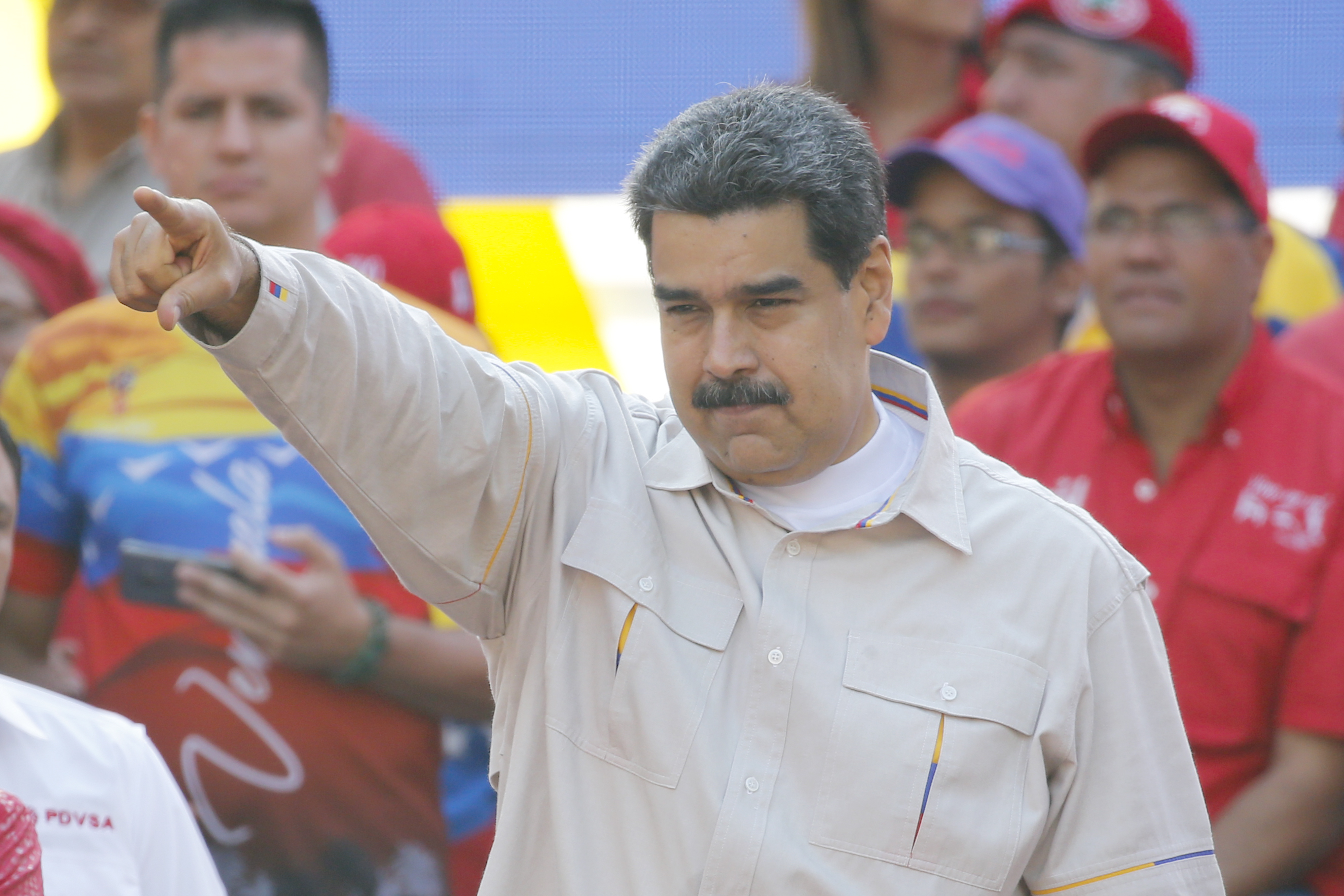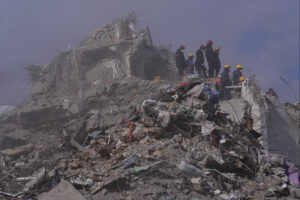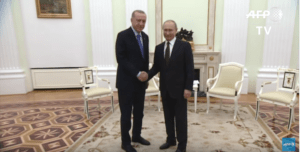Is ‘Dictator’ the Media’s Most Insidious Code Word?
Countless governments exhibit authoritarian tendencies, but our political press is all too eager to smear those hostile to U.S. interests. Venezuelan President Nicolas Maduro. (Ariana Cubillos / AP)
Venezuelan President Nicolas Maduro. (Ariana Cubillos / AP)
Let’s start with a quiz: Quick! Name some dictators!
I’m willing to bet most of you responded with just a few of the same names: Assad, Putin, Castro, Kim Jong-un, Gaddafi, Maduro. This is not because they are the only dictators in the world (far from it), or that all of them even necessarily qualify for the title, but precisely because these are the figures most constantly labeled as such by our media.
“Dictator” is a very powerful moniker to give someone. There is a hard-to-define but very important distinction between a government with authoritarian tendencies or a poor human rights record, on the one hand, and a full-blown dictatorship. The very name implies that dictatorial governments should, nay, must be resisted and overthrown, while the same action is not appropriate or justifiable for the former.
Democracy is a supposedly sacred ideal for Americans. Politicians and media tell us that the United States “stands for” democracy and opposes dictatorships everywhere, one reason why the US must continue to involve itself diplomatically and militarily around the world.
However, Freedom House’s “Freedom in the World” studies find that 49 countries—over a quarter of the world’s governments—are “not free”, a designation they use interchangeably with “dictatorships” on their website and their reports. Why then, do most politically savvy people not know the names of all these dictators? Why are they not household names, like Assad and co.? Is it because the United States provides military assistance (training, sales and aid) to three-quarters of them, as Rich Whitney’s study (Truthout, 9/23/17) suggests?
How Free is Freedom House?
Defining and quantifying what does and does not constitute a dictatorship is a notoriously tricky business, and Freedom House’s strong conservative political bias makes its list and judgments all the more questionable. For one, the “non-governmental” organization is actually overwhelmingly funded by Washington, who employed Freedom House in 2006 to perform “clandestine activities”—i.e., regime change operations—in Iran.
The man in charge of compiling the freedom list, used by Whitney and many others, admitted his methodology consisted of “hunches and intuition.” And as many scholars have indicated, Freedom House also has a long history of supporting US client state dictatorships and attacking enemy states such as Nicaragua; the ratings have a strong conservative and pro-US ideological bias. Nevertheless, its index is useful, as it is the most commonly cited source on the matter, and one can assume that it is not going out of its way to falsely label US allies as dictators.
When you look at the governments that Freedom House describes as dictatorships, those that are also Official Enemies are frequently described as such in corporate media—for example, Russia (Washington Post, 5/8/18), Cuba (USA Today, 2/26/19), Syria (New York Times, 3/2/19), Belarus (ABC, 3/5/19), North Korea (USA Today, 3/22/19) and Venezuela (New York Times, 4/10/19). Yet “our dictators”—that is, the “not free” governments that Washington supports—are rarely if ever labeled as dictatorships by the establishment press. In fact, there is very little coverage at all of those countries that are “behaving themselves” as far as the US State Department is concerned.
Let’s look at the press coverage of four of Freedom House’s “dictators” who receive US military aid, all of whom have been in the news recently: Paul Biya of Cameroon, Abdel el-Sisi of Egypt, Abdelaziz Bouteflika of Algeria and Kazakhstan’ s Nursultan Nazarbayev.
Cameroon
The 86-year-old Paul Biya, the longest serving non-royal head of state in the world, has held office in Cameroon since Gerald Ford was president. He recently won a seventh term in office that Foreign Policy (10/22/18) described as a “farce.” Cameroon has been in the news of late, due to the government’s human rights abuses pushing the country to the brink of a civil war. Freedom House considers it to be one of the least free countries in the world.
However, when discussed at all, Biya was presented matter-of-factly by the media, without the need to add call him a “dictator.” The New York Times (10/6/18) presented him euphemistically as “one of the world’s longest-serving presidents.” From the coverage, readers would not know he is a dictator, even by Freedom House’s standards. In fact, going through fully 20 years of coverage in the Times, Biya was never once described as a “dictator,” “despot,” “tyrant” or any other similar designation.
When Biya was rebuked at all, the tone of the coverage was less condemnatory and more muted criticism. Voice of America (2/14/19) noted that Biya’s decision to remove presidential term limits (meaning he could rule for life) led some “critics” to call the move “authoritarian.”
Egypt
Gen. Abdel el-Sisi came to power in 2013 in a military coup that overthrew the democratically elected government of President Mohamed Morsi. Sisi recently announced his plan to rule until 2034—effectively in perpetuity.
The New York Times’ article (2/14/19) on the subject noted that this would “further entrench his authoritarian rule,” and even noted he had jailed “tens of thousands” of opponents, muzzled the internet and taken over the courts. Nevertheless, it stopped well short of calling him a dictator. Indeed, it noted that he enjoyed strong support from around the world, and was seen as a “bulwark against Islamist militancy” in the region, endorsed by the US and France. Other media outlets followed this tendency. CNN (2/13/19) simply described him as “current President Abdel Fattah el-Sisi,” while NPR (2/14/19) likewise just referred to “Egyptian President Abdel-Fattah el-Sissi.”
While accurately noting Sisi’s “unprecedented crackdown on dissent,” which imprisoned “tens of thousands of people,” the BBC’s report (2/15/19) labeled him neutrally as “president,” and only characterized his steps to rule virtually indefinitely as something “opponents of the proposal describe” as “a further step towards authoritarianism.” Thus, its strongest criticism of Egypt is that it’s accused of moving toward “authoritarianism”—a long way from being a full-fledged “dictator.”
Algeria
After he announced he intended to stand once again for president, massive protests broke out all around Algeria against 82-year-old Abdelaziz Bouteflika. The uprising has been serious enough that he has promised to stand down. Despite coming to power fraudulently and ruling with an iron fist for 20 years, media outlets (e.g., CNN, 3/11/19; Reuters, 4/2/19) have refrained from describing him as a dictator, with the BBC (3/6/19) simply referring to him as a “reclusive president.”
Indeed, reading the Guardian’s coverage (4/1/19), one would have no idea he was not the epitome of a democrat. The New York Times(3/12/19) also praised Bouteflika for “bringing back stability” to the North African country, and “restoring the honor of the nation’s army.” As with Cameroon’s Biya, Bouteflika has never once been described as a “dictator” in the last 20 years of Times coverage.
Kazakhstan
Another ruler propped up with US military aid is Nursultan Nazarbayev. The 85-year-old, in power since 1989, recentlyannounced he would step down. It was also revealed that Kazakhstan’s capital, Astana, would berenamed Nursultan in his honor (not a common occurrence in democracies—with Washington, named for the winner of an election that involved approximately 1 percent of the population, arguably not an exception).
The Washington Post editorial board (3/29/19) published a glowing appraisal of his tenure. It presented him as a visionary leader, an ex-steelworker “who led the former Soviet republic out of the empire’s chaotic implosion,” claiming he brought Kazakhstan into a peaceful, prosperous new era, while “building national identity” and stopping any ethnic conflict. While noting that he “ruled as a strongman” and “would have been wiser to view dissent and democracy with more tolerance,” the editorial implied his repression was justified, concluding “he won’t be soon forgotten” by his people.Nazarbayev has a long history of cracking down on freedom of speech, the press and religion, and uses torture against his political opponents. Despite this, he was presented positively in the media, with the New York Times (3/19/19) simply referring to him as the “longtime president of Kazakhstan.” The Associated Press (3/19/19) called him “the only leader that independent Kazakhstan has ever known,” praising him for “maintaining stability.” Reuters (3/19/19) claimed he was a “widely popular” leader, with none of the above using the “dictator” moniker.
Double Standards
The double standard is highlighted by the constant media references to enemy states as dictatorships, whether the label is warranted or not. The Washington Post (1/4/19) describes leftist Bolivian President Evo Morales as “wishing to become a Venezuela-style dictator,” while the Guardian(12/3/18) carries warning of Bolivia becoming an “imminent ‘Venezuelan-Cuban-style’ dictatorship.”
The leftist Sandinista government of Nicaragua is constantly called a “dictatorship” as well. The New York Times (8/2/18) published an opinion piece from a Nicaraguan headlined “A Dictatorship Is Rising in My Country Again.” Many other outlets describe him as a “dictator” (Economist, 7/12/18; Time, 3/18/19) carrying out a “terrifying crackdown” (National Review, 3/15/19)—language that is never used for US-backed dictatorships.
And it takes only a cursory glance at the headlines to see how Nicolas Maduro, “the child butcher of Venezuela” (Washington Examiner, 2/21/19), is portrayed:
- “The Dictator of Venezuela Earns His Title” (New York Times, 2/27/19)
- “Venezuela’s Dictator Maduro Survived a Tough Week, but His Problems Are About to Get Worse” (Miami Herald, 2/25/19)
- “Why Are Progressives More Focused on Disagreeing With Trump Than Countering a Dictator [Maduro]?” ( Washington Post, 3/2/19)
- “Newt Gingrich: Venezuela’s Dictator Maduro Must Go—Even if the Military Has to Intervene” (Fox News, 3/14/19)
- “Maduro Really Didn’t Like Being Asked if He’s a ‘Dictator’” (New York Post, 2/26/19)
- “Gen. Jack Keane, Hans Humes on Venezuela’s Socialist Dictator Maduro’s Potential Exit” (Fox Business, 3/7/19)
Is it truly a coincidence that these three countries with elected leftist heads of state are constantly labeled “dictatorships”? Bolivia is not even on Freedom House’s “not free” list—unlike Cameroon, Egypt, Algeria and Kazakhstan. Venezuela and Nicaragua were recently added to it, despite the fact that both countries’ latest elections were endorsed internationally.
While there are some clear shortcomings to Venezuela and Nicaragua’s political systems, the US-dominated Organization of American States observed the 2017 Nicaraguan municipal elections and declared that “the popular will [was] expressed through the vote in the vast majority of Nicaragua’s municipalities.” (With 53 percent turnout, the governing Sandinista party won in 135 out of 152 communities, with the Independent Liberal Party taking 12 of the remainder.)
Meanwhile, Venezuela’s 2018 elections were endorsed by 150 international observers, including foreign ex-heads of state like Spain’s Jose Zapatero and Ecuador’s Rafael Correa, with three international election observation teams endorsing the result, despite the fact that US media wrote them off as a sham (FAIR.org, 5/23/18).
The same cannot be said for Kazakhstan, even by Freedom House, that notes that “none of the elections held in Kazakhstan since independence have been considered ‘free and fair’ by credible international observers.” Nursultan was declared to have won 98 percent of the vote in 2015.
Enemy states are covered far more and far more harshly in US corporate media than friendly ones. A search for Paul Biya in the NYTimes.com database elicits 97 results, compared to 1,135 for Maduro, 713 for Morales and 3,517 for Ortega, despite the fact that Biya has been in power as long as the other three combined. (Cameroon’s population is 24 million, three-fourths the size of Venezuela, more than twice as big as Bolivia and four times as populous as Nicaragua.)
In a recent article (FAIR.org, 3/23/19), I suggested that the term “moderate” or “centrist” has a tactical definition when used in the media. It does not refer to any political positions, but is used as a way of conveying legitimacy. Thus anyone the media approve of is, by definition, a moderate. FAIR (8/20/18) has also noted that a “regime,” in US media usage, is simply a government that is at odds with the US empire.
The “dictator” label is also a powerful cue, used by media to prime the reader to see a particular country or leader a certain way. Readers are invited to feel outraged at the misdeeds of Assad, Putin or other anti-US head of states, while authoritarian rulers that toe the US line are ignored or even praised. The choice of whether to use a word like “dictator” frames a country in a way conducive to elite US interests, conveying legitimacy or the lack thereof in a single label.
Your support matters…Independent journalism is under threat and overshadowed by heavily funded mainstream media.
You can help level the playing field. Become a member.
Your tax-deductible contribution keeps us digging beneath the headlines to give you thought-provoking, investigative reporting and analysis that unearths what's really happening- without compromise.
Give today to support our courageous, independent journalists.








You need to be a supporter to comment.
There are currently no responses to this article.
Be the first to respond.